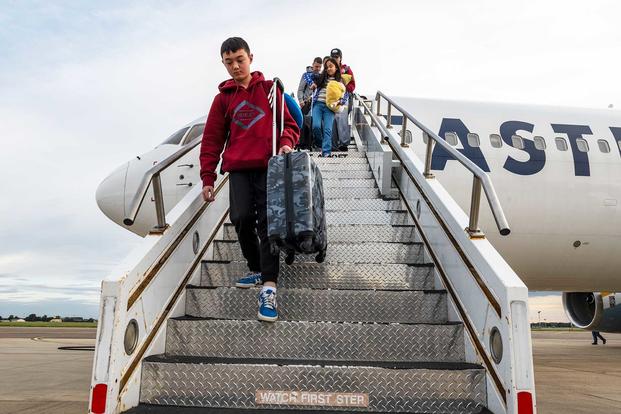Editor's note: On Jan. 17, 2025, members of the Biden administration released a memo clarifying that no international agreement specifically prohibits the employment of authorized dependents in the country where they are located.
When Beth Conlin's family got orders that they were going overseas in 2013, she had to quit her job because no rules existed that could guarantee she'd be able to keep her status as a military family member.
Conlin now works for Amazon and advocates for better rules to help military families living and working overseas, specifically the status of forces agreements, aka "SOFA rules," that the U.S. enters into with host countries.
Out of her family's 14 permanent change of station (PCS) moves, 13 crossed an ocean to an OCONUS location outside the continental U.S.
Related: Dealing with SOFA Rules and Taking Your Career Overseas
In an episode of the "PCS with Military.com" podcast, Conlin shared insights into how SOFA rules affect spouses who want to continue doing their remote jobs after they PCS, plus how to convince an employer to go along with it.
What Are SOFA Rules, and Why Aren't They Consistent?
Anywhere the U.S. has a permanent troop presence, it has a status of forces agreement, which is a type of peacetime treaty with the host country, Conlin said.
SOFA rules started out simply addressing how U.S. troops were treated under the law wherever they got stationed.
For example, "if a service member ran a red light in Munich, Germany, the status of forces agreement essentially would ensure that service member had appropriate legal protections."
The original agreements didn't address family members' rights, because families typically didn't go along on overseas assignments.
Now the U.S. is a party to 122 status of forces agreements, Conlin said, and on the U.S. side alone, the Defense and State departments and the Senate all have a role in making changes to them.
Alleviating the complexity to a degree is a "blanket" status of forces agreement with NATO countries, but amendments to those blanket SOFA rules exist in the agreements with Italy, Germany and Spain.
Therefore, "it's so important to understand what country you're going to and then figure out the rules of operation in that country," Conlin said.
How Do SOFA Rules Affect Spouses' Jobs Today?
Think of your SOFA status as your visa, Conlin said -- like how a travel visa permits travelers to spend time in a foreign country or how a work visa allows employees to work there.
"Your SOFA status, regardless of what country you're in, is essentially like your reason to be there for longer than the standard 90 days" allowed under travel visas, Conlin said. The SOFA rules often don't address employment. "Working in the country is a completely separate issue in most cases."
Because many SOFA agreements don't address remote work, spouses often wrongly assume that means they can't do it, Conlin said.
Similarly, some families assume that their SOFA status means they're effectively on U.S. soil if they're living on-base, "which is also not correct," Conlin said. "So ... we need to take some ownership of what it means to go overseas. ... In most cases, you'll need to [do] what's called 'tax equalize' yourself to that host country" and get paid in its currency.
Momentum Is Gaining to Address Remote Work
A "battle cry from the spouse community" has grown louder over the past five years or so to "fix this," putting pressure on host countries and the U.S. military's judge advocate general offices there to "just get the information together," Conlin said.
The local JAG offices can't advise on employment, but they can advise on taxes, and "the crux of the situation in the employment space is about taxes," she said.
A few host countries that became "notorious" for misrepresenting their SOFA rules "have been really pressed to clarify and be truthful and upfront with that. So countries like Italy and Germany actually now have pretty good information."
By contrast, the likes of South Korea and Japan have "very easy one-pagers that are like, 'Here's the rules of engagement in our country,'" Conlin said.
Meanwhile, with more countries introducing "digital nomad" work visas, "there has been an increased push to say, 'Can we wrap this into SOFA? Can we clarify this language?'"
Conlin cautioned that a digital nomad work visa probably isn't the right choice for a military spouse, because it would cancel their SOFA status and all the privileges that go along with being part of a U.S. military household.
How to Arrange Overseas Remote Work with Your Employer
Laws that govern remote work overseas differ depending on whether the employer is global, with offices in the country, or generally U.S.-based.
If Conlin were moving to Germany, for example, she'd have to "align" with Amazon offices in that country, get paid in euros and pay German taxes. In this type of situation, you'll likely need to involve your company's human resources department.
You'll also need to work closely with HR if your company is U.S.-based because of "varying degrees of acceptance based on the size and, honestly, level of risk that those employers are willing to take," Conlin said.
"We do have a lot of small U.S.-based employers that continue to employ spouses overseas, and they are confident in their ability to do so, based on our unique tax statuses using the Military Spouses Residency Relief Act."
Self-Employed Spouses Also Need to Check the Rules
Some countries address self-employment in the SOFA, saying that as long as the work doesn't engage in the local economy, it's fine.
"But it does vary country by country," Conlin said, so, again, "go to the JAG office to talk about taxes, and they will be able to advise you on that 1099 status."
On the U.S. side, she advised spouses to consult the Social Security Administration's process for exempting themselves from the foreign country's social security taxes.
-- Amanda Miller can be reached at amanda.miller@monster.com.
Keep Up-to-Date for Your Next PCS
Get the inside information from those who know. Get PCS help and all the news and benefits information you need delivered straight to your inbox. Subscribe to Military.com now.














